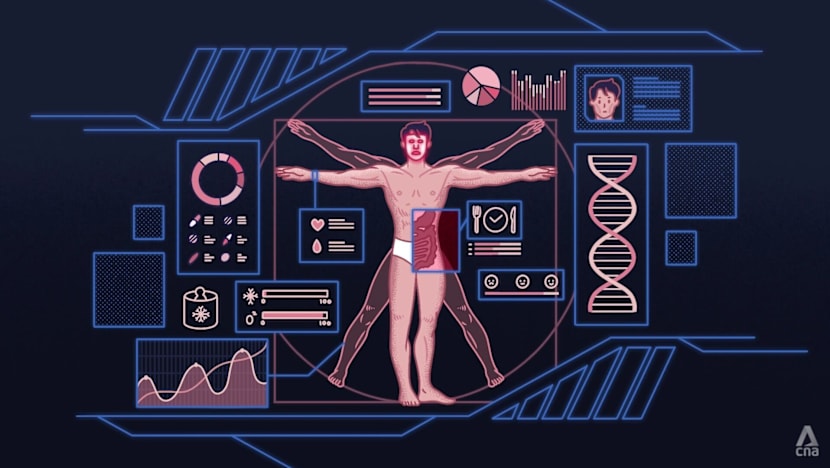Health
Biohacking: Individuals Rewrite Their Health Through Data

Biohacking, a movement aimed at optimising human health through experimental techniques, is gaining traction among individuals seeking to extend their lifespan and enhance their overall well-being. This trend is exemplified by dedicated practitioners like Nicholas Lin, a 43-year-old entrepreneur, who meticulously follows a daily regimen of nutrition, exercise, and supplements in his quest for peak physical and mental performance.
Lin’s daily routine begins with seven hours of uninterrupted sleep, followed by a breakfast complemented by a stack of 34 supplements. His diet, which includes 2,050 to 2,250 calories daily, is rich in protein sources such as grass-fed beef and eggs, and he engages in a low-impact strength training session each evening. Furthermore, Lin dedicates an hour to what he refers to as his “anti-aging room,” equipped with devices like red light panels and an oxygen concentrator, aimed at boosting cellular health.
Reflecting on his journey, Lin noted, “I thought about what my mental and cognitive peak of my life was, and I figured that was around 26 or 27 years old, so I set up a goal to achieve that, like de-aging myself by almost 20 years.” His meticulous tracking of health metrics, which he began seven years ago, allows him to fine-tune his approach based on data he gathers.
Lin is not alone in this pursuit. Vignesa Moorthy, a 52-year-old CEO in the cybersecurity industry, turned to biohacking after his mother’s cancer diagnosis in 2019. Moorthy’s transformative journey includes eliminating alcohol and cigarettes and introducing monthly water fasts to detoxify his body. He has built a personal longevity lab at home, featuring advanced tools such as a hyperbaric oxygen chamber and red light panels. Moorthy estimates spending approximately S$50,000 (US$38,500) annually on his biohacking endeavors, which include regular blood tests and treatments.
In an academic context, Professor Dean Ho from the National University of Singapore is also exploring the potential of biohacking. Beginning with a basic glucose monitoring kit in 2021, he has conducted extensive self-experimentation, including fasting for up to 20 hours a day and exploring how different dietary choices can impact metabolic health. His ongoing research aims to develop a framework for understanding individual health trajectories, which he refers to as “delta.”
Emerging Trends in Biohacking
The biohacking community is diverse, with some members focusing on lifestyle changes such as diet and exercise, while others embrace technological advancements like red light therapy and cryotherapy. These methods, once confined to clinical settings, are now accessible for home use, leading to a broader acceptance of self-optimisation techniques.
Prominent figures in the field, such as tech entrepreneur Bryan Johnson, have amplified the visibility of biohacking. Johnson, who adheres to a rigorous daily schedule centred around nutrition and exercise, has gained notoriety for spending an estimated US$2 million annually on his anti-aging regimen. His practices, including past ventures into blood transfusions from his teenage son, have sparked both interest and controversy.
Despite the enthusiasm surrounding biohacking, experts urge caution. Dr. Laureen Wang, head of the Healthy Longevity Research Clinic at Alexandra Hospital, warns that many biohacking interventions lack sufficient scientific evidence and may pose safety risks. She notes that the DIY nature of biohacking can lead to untested therapies gaining popularity without rigorous validation.
Furthermore, Professor Wang Yibin from Duke-NUS Medical School emphasises the importance of clinical trials in establishing the efficacy of new treatments. “Applying findings from pre-clinical models to humans can be dangerous,” he said, underscoring the need for careful consideration of individual health baselines before attempting biohacking practices.
Balancing Innovation with Safety
The experiences of biohackers reflect a broader trend of individuals taking control of their health through data-driven approaches. However, the fine line between optimisation and obsession is a concern for many in the medical community. Experts recommend that individuals consult healthcare professionals when considering biohacking interventions to avoid potential pitfalls and ensure personalised strategies are safe and effective.
For those within the biohacking community, such as Lin and Moorthy, the motivations extend beyond mere longevity. They seek to enhance their quality of life, emphasising the importance of foundational health principles such as sleep, nutrition, and exercise. Moorthy remarked, “After doing quite a lot of things, I have now come to one of the most important conclusions: Sleep is probably the single most important thing to do.”
As biohacking continues to evolve, the balance between innovation and safety will be vital to its sustainability. Experts agree that while the allure of self-optimisation is powerful, a solid grounding in science and a commitment to evidence-based practices will ultimately define the future of this burgeoning movement.
-

 Lifestyle3 months ago
Lifestyle3 months agoHumanism Camp Engages 250 Youths in Summer Fest 2025
-

 Sports3 months ago
Sports3 months agoDe Minaur Triumphs at Washington Open After Thrilling Comeback
-

 Business4 months ago
Business4 months agoKenvue Dismisses CEO Thibaut Mongon as Strategic Review Advances
-

 Sports4 months ago
Sports4 months agoTupou and Daugunu Join First Nations Squad for Lions Clash
-

 Top Stories4 months ago
Top Stories4 months agoColombian Senator Miguel Uribe Shows Signs of Recovery After Attack
-

 World4 months ago
World4 months agoASEAN Gears Up for Historic Joint Meeting of Foreign and Economic Ministers
-

 Business4 months ago
Business4 months agoOil Prices Surge Following New EU Sanctions on Russia
-

 Entertainment3 months ago
Entertainment3 months agoDetaşe-Sabah Violin Ensemble Captivates at Gabala Music Festival
-

 Health3 months ago
Health3 months agoNew Study Challenges Assumptions About Aging and Inflammation
-

 Entertainment3 months ago
Entertainment3 months agoBaku Metro Extends Hours for Justin Timberlake Concert
-

 Business4 months ago
Business4 months agoU.S. House Approves Stablecoin Bill, Sends to Trump for Signature
-

 Top Stories4 months ago
Top Stories4 months agoRethinking Singapore’s F&B Regulations Amid Business Closures









